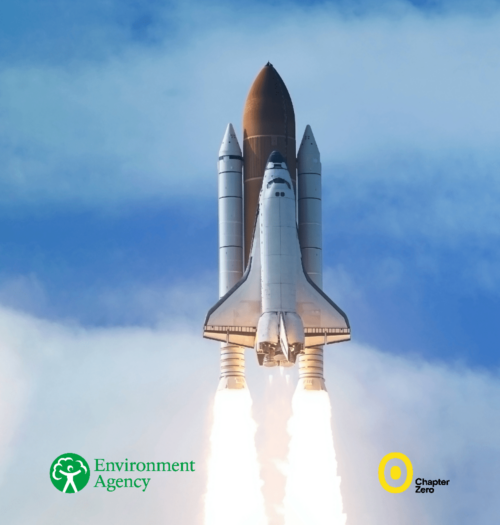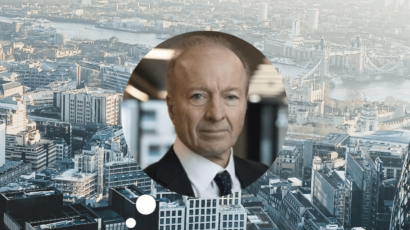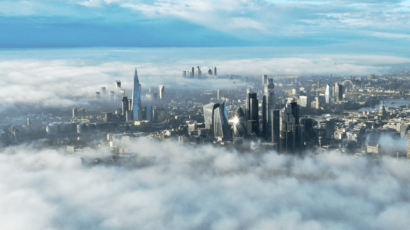
10 top tips for leaders who want to get their organisation to net zero
What unites a board on climate action?
In late February, I joined Chapter Zero members at a breakfast briefing to share my experience of being the Environment Agency Chief Executive as we committed to be net zero for carbon by 2030, working out how we were going to do that, issues that we faced and things we have learned along the way.
Shooting for the moon
We have a saying in my executive team: “Everybody must be heard. We don’t all have to agree. But we do have to make a decision.” And on this subject everyone was indeed heard. We didn’t all agree, but we did eventually make a decision. In 2019 we committed the Environment Agency to be net zero for carbon by 2030.
There was little debate over whether we should aspire to be a net zero organisation. The main difference in views was the impact it might have on our operations and, more philosophically, if it was right to make a commitment to do something without knowing precisely how to do it.
In the end we were inspired by something that many have called humanity’s greatest ever achievement: the US Apollo Programme. In September 1962, President Kennedy publicly committed the United States to putting a man on the Moon by the end of that decade and bringing him safely home again: a SMART target if ever there was one.
We thought that if the US could put a man on the Moon inside seven years without initially knowing how to do it, the Environment Agency could probably get itself to net zero in eleven years on the same basis.
The Environment Agency Board readily and unanimously endorsed that decision. They were then, and remain now, our biggest supporters and champions as we seek to deliver it.
Will we get there by 2030?
Honest answer: I don’t know. As we’ve gone further it’s got harder and there have been unexpected technical, resource and cultural challenges. Personally, I think we will. But that depends on several questions to which we don’t yet know the answer.
But seven years away from their goal, NASA also thought they weren’t going to make it. And EA staff are just as clever, innovative and dedicated as those who put Neil Armstrong on the Moon. So we are going to carry on driving towards that target, do what we can, use what we have, and see where we get to.
What I’ve learned
While I would love to hit our 2030 target, not least since I have a big personal stake in doing so, I’m sure that if we don’t make it exactly on time it doesn’t mean it isn’t worth doing. What matters is outcomes: driving down our emissions and locking up the rest as fast as possible. To achieve that, the most important thing is that we keep the goal in sight, and that we continue to think differently about what we do and how we do it. I’ve learned that getting to net zero is easy to say but difficult to do, and a good deal harder than I thought it would be.
But I’ve also learned that the decision to make ourselves a net zero organisation was the right thing to do, not least because it is giving us a whole set of benefits that I didn’t anticipate.
You can read more on the specific challenges we faced and the unexpected benefits we found here.
My top 10 tips
- It’s all about leadership. Organisations behave like their leaders. So if you are serious about getting yours to net zero, show it and mean it. Your Board and your executive leadership team need to be united behind the goal and visibly committed to reaching it.
- The main thing is to make sure the main thing really is the ‘Main Thing’. If you want your organisation to get to net zero, you need to put it at the heart of your day-to-day business as an essential outcome that everyone is responsible for delivering. Don’t treat it as a nice-to-have add-on or the responsibility of a few people in a net zero unit.
- You can never have enough good communication. Talk regularly to your own staff about the goal, why it matters, and where you are making progress: nothing succeeds like success.
- What gets measured gets done. Have a net zero metric as one of your Key Performance Indicators, review progress regularly, and intervene if you are off course.
- Reinforce the behaviour you want: recognise and reward those who are helping you get there and tackle those who aren’t.
- Governance matters: work out how you are going to oversee delivery of your target, be clear who is responsible for what and hold them to account. This is relevant for all members of the board.
- Experiment. Be prepared to take a risk that something won’t work: at the very least you’ll learn how not to do it.
- Learn from others. Look at what other organisations are doing, share your own successful ideas and adopt theirs.
- Don’t be afraid of stretching targets. You will come under regular pressure to adjust or dilute the targets or the deadline or both to make them easier to achieve. Don’t, unless you think it will lead to better outcomes. Unless your organisation is really stretched by the targets, you won’t garner the momentum you need to get there.
- The journey is as important as the destination. Even if you don’t hit your deadline, it’s still worth the effort: you will energise your organisation, stimulate innovation, attract more talent, and learn things you didn’t even know you didn’t know.
Since I’ve been channelling President Kennedy, let me end with another quotation from him. This is for anyone considering whether to commit themselves or their organisation to tackling the climate emergency and setting a net zero target: “If not us, who? And if not now, when?”

Guest authors
Our guest authors write in a personal capacity and the views expressed within may not reflect those of Chapter Zero.
More from Sir James Bevan
For more information on the Environment Agency’s plans and progress, and to hear more from Sir James Bevan, read his full speech from the Chapter Zero breakfast briefing on 28 February 2023.
Read the full speech



